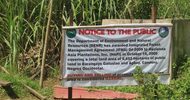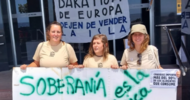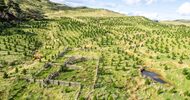A tycoon once named one of Indonesia’s richest has gone on trial for alleged corruption estimated to have cost the state the equivalent of US$5.25 billion and caused major environmental damage from the destruction of vast amounts of virgin forest for oil palm plantations.
- Asia Sentinel
-
09 September 2022
Masyarakat Adat lembah Grime Nawa Kabupaten Jayapura dikagetkan dengan kehadiran Perusahaan sawit PT.Permata Nusa Mandiri diatas tanah adat lembah Grime Nawa. Perusahaan sawit secara sepihak telah mengklaim tanah adat seluas 30.920 hektar di 6 Distrik yaitu: Distrik Unurumguay, Distrik Nimbokrang, Distrik Nimboran, Distrik Namblong, Distrik Kemtuk Gresi, dan Distrik Kemtuk.
- Masyarakat Adat Lembah Grime Nawa
-
07 September 2022
Setelah lebih dari sepuluh tahun berlalu, apa yang terjadi dan tengah dialami oleh Masyarakat Adat setempat dan tanahnya yang dijadikan area untuk Merauke Integrated Food and Energy Estate? Yayasan Pusaka Bentala Rakyat bersama Perkumpulan Petrus Vertenten MSC Papua, melakukan dokumentasi lapangan terkait situasi dari masyarakat adat dan tanahnya yang terdampak proyek MIFEE
- Pusaka Bentala Rakyat
-
29 August 2022
The government of Indonesia’s Papua province has recommended that district officials revoke the permits of 35 of the 54 oil palm concessions operating there.
Pengelolaan proyek Food Estate Bangun Bumi Papua akan diserahkan pada PT Alamindo Lestari Sejahtera Tbk yang memiliki lebih dari 500.000 hektar konsesi logging di lima kabupaten di Papua Barat.
- Pusaka Bentala Rakyat
-
28 May 2022
The companies that sell oil palm to major firms like Johnson & Johnson, Kellogg's and Mondelēz are depriving indigenous communities of potentially millions of dollars of income, a joint BBC investigation has found.
A satellite image shows that 300 hectares of forest have been cleared by two oil palm companies in Sorong Regency, Papua. The two companies are owned by the CEO of First Resources.
- Yayasan Pusaka
-
21 May 2022
The Indonesia government's Food Estates programme could could lead to corruption, where corporate and state actors and their family and friends – not West Papuans – benefit from the allocation of land for Food Estates.
- TAPOL/awasMIFEE!
-
29 April 2022
New Guinea, contains the world’s largest planned oil palm plantation. Covering 2,800 square kilometers the Tanah Merah project is nearly the size of the U.S. state of Rhode Island. However, the true owners of the seven concessions that make up the project remain hidden through a shroud of corporate secrecy.
Food estate atau komplek pangan skala-luas, yang punya rekam jejak kegagalan di masa sebelumnya, muncul di tengah konteks lebih genting. Ia rilis ketika pandemi menunjukkan bahwa sistem pangan global dominan hari ini ternyata rentan menghadapi krisis.
Colonial and anti-colonial movements’ have deeply shaped the patterns and impacts of concessions in Southeast Asia. In some cases, communities have experienced dispossession through land grabs dressed as concessions. In others, concessions are part of a re-concentration of land holding.
Did Indonesia just save a forest the size of Belgium? Or open the floodgates for its destruction? One giant, controversial palm plantation development, whose permits were among those cancelled, will be a crucial test.
















